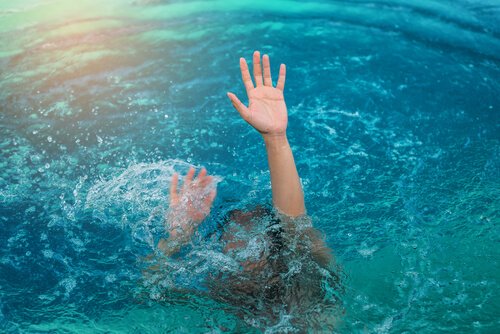Aquaphobia: The Fear of Water

Water is an absolutely necessary part of life for most living creatures. Not being in frequent contact with it in some way or another is tricky, and a big problem for anyone with aquaphobia, or the fear of water.
Aquaphobia is essentially a handicap a human can develop when they come into contact with water for the first time. This is during the exploration, discovery, and adaptation stages, and you’re reluctant around water (Saquicela and Jacinto, 2010).
Aquaphobia, or the fear of water, is a psychological condition that involves excessive, irrational, and unjustifiable fear towards water.
“Nothing in life is to be feared, it is only to be understood. Now is the time to understand more, so that we may fear less.”
-Marie Curie-
Symptoms of aquaphobia
Physical symptoms
Here are some of the physical symptoms someone with this fear might experience:
- An increase in heart rate
- Rapid breathing
- Hyperventilation or a feeling of drowning or choking
- Muscle tension throughout the body
- Excessive sweating all over the body and/or cold sweats
- Aches in the stomach and/or head
- Detachment from reality or de-personalization
- Dilated pupils
- Nausea, dizziness, and vomiting

Mental symptoms
The physical symptoms reinforce the cognitive ones. They cause a series of negative thoughts when a person with this fear is close to the water. Those negative thoughts also create and feed doubts about their ability to be near the water.
Behavioral symptoms
- Avoidance: This is one someone avoids contact with water at all costs. All this does is increase their fear and prevent them from overcoming it.
- Escape: When they can’t avoid contact, they’ll try to get out of the situation as quickly as possible.
“The less there is of fear, the less there is of danger.”
-Livy-
The causes of aquaphobia
According to Calamnia (1993), there are two basic causes of aquaphobia:
- Being taught to fear water or bodies of water. The adult around you transmits their fear, which, when causes you (as a child) to make that fear your own, even if you haven’t experienced it yourself. This is the most common cause.
- Bad experiences or stressful situations with water, such as being pushed in.
According to Zubiaur and Gutiérrez (2003), when it comes to aquaphobia and motor behavior, there are several factors to consider:
- Fear of cognitive, or psychological threats:
- Failure- This is one of the most common causes with children and gets worse as they get older. This could be because they don’t trust themselves or worry about what will happen if it goes wrong.
- Being poorly judged
- Being socially ridiculed- This plays a big role in adolescents, and can often last into adulthood.
- Competition
- Fear because of physical insecurity:
- Your first experiences with water involve trying to learn unfamiliar movements, in an unfamiliar setting. Those unusual movements can cause you to lose your spatial orientation or sense of balance, and make you afraid.
- If you add the fact that it’s a new situation, that you might be insecure and stressed about doing it well, and that the fear could be there both during and after, then it can get very intense.
“You are born with only two fears: fear of failing and fear of loud noise. All the rest is learned. And it’s a lot of work!”
-Richard Bandler-

How do you treat aquaphobia or the fear of water?
Like with just about any phobia, exposure therapy is the most common treatment for aquaphobia. That exposure can happen in two ways: live or virtual (the second one is thanks to modern technology).
In both of them, you put yourself into the situation you’re afraid of and gradually learn to “unlearn your fear” of water by going from situations that cause you the most fear, to situations that cause you the least.
Doctors often combine exposure therapy with medications that can help people with a phobia react better to their fears. SSRIs (selective serotonin reuptake inhibitors) can reduce people’s anxiety attacks and panic. Just remember that these medications are a bandaid, not a cure, and have withdrawal symptoms. Be careful about using them long-term.
Doctors and therapists also use stress reduction techniques like relaxation, yoga, meditation, etc…There are also more and more people advocating for mindfulness and focusing on techniques to overcome these kinds of fears.
Water is an absolutely necessary part of life for most living creatures. Not being in frequent contact with it in some way or another is tricky, and a big problem for anyone with aquaphobia, or the fear of water.
Aquaphobia is essentially a handicap a human can develop when they come into contact with water for the first time. This is during the exploration, discovery, and adaptation stages, and you’re reluctant around water (Saquicela and Jacinto, 2010).
Aquaphobia, or the fear of water, is a psychological condition that involves excessive, irrational, and unjustifiable fear towards water.
“Nothing in life is to be feared, it is only to be understood. Now is the time to understand more, so that we may fear less.”
-Marie Curie-
Symptoms of aquaphobia
Physical symptoms
Here are some of the physical symptoms someone with this fear might experience:
- An increase in heart rate
- Rapid breathing
- Hyperventilation or a feeling of drowning or choking
- Muscle tension throughout the body
- Excessive sweating all over the body and/or cold sweats
- Aches in the stomach and/or head
- Detachment from reality or de-personalization
- Dilated pupils
- Nausea, dizziness, and vomiting

Mental symptoms
The physical symptoms reinforce the cognitive ones. They cause a series of negative thoughts when a person with this fear is close to the water. Those negative thoughts also create and feed doubts about their ability to be near the water.
Behavioral symptoms
- Avoidance: This is one someone avoids contact with water at all costs. All this does is increase their fear and prevent them from overcoming it.
- Escape: When they can’t avoid contact, they’ll try to get out of the situation as quickly as possible.
“The less there is of fear, the less there is of danger.”
-Livy-
The causes of aquaphobia
According to Calamnia (1993), there are two basic causes of aquaphobia:
- Being taught to fear water or bodies of water. The adult around you transmits their fear, which, when causes you (as a child) to make that fear your own, even if you haven’t experienced it yourself. This is the most common cause.
- Bad experiences or stressful situations with water, such as being pushed in.
According to Zubiaur and Gutiérrez (2003), when it comes to aquaphobia and motor behavior, there are several factors to consider:
- Fear of cognitive, or psychological threats:
- Failure- This is one of the most common causes with children and gets worse as they get older. This could be because they don’t trust themselves or worry about what will happen if it goes wrong.
- Being poorly judged
- Being socially ridiculed- This plays a big role in adolescents, and can often last into adulthood.
- Competition
- Fear because of physical insecurity:
- Your first experiences with water involve trying to learn unfamiliar movements, in an unfamiliar setting. Those unusual movements can cause you to lose your spatial orientation or sense of balance, and make you afraid.
- If you add the fact that it’s a new situation, that you might be insecure and stressed about doing it well, and that the fear could be there both during and after, then it can get very intense.
“You are born with only two fears: fear of failing and fear of loud noise. All the rest is learned. And it’s a lot of work!”
-Richard Bandler-

How do you treat aquaphobia or the fear of water?
Like with just about any phobia, exposure therapy is the most common treatment for aquaphobia. That exposure can happen in two ways: live or virtual (the second one is thanks to modern technology).
In both of them, you put yourself into the situation you’re afraid of and gradually learn to “unlearn your fear” of water by going from situations that cause you the most fear, to situations that cause you the least.
Doctors often combine exposure therapy with medications that can help people with a phobia react better to their fears. SSRIs (selective serotonin reuptake inhibitors) can reduce people’s anxiety attacks and panic. Just remember that these medications are a bandaid, not a cure, and have withdrawal symptoms. Be careful about using them long-term.
Doctors and therapists also use stress reduction techniques like relaxation, yoga, meditation, etc…There are also more and more people advocating for mindfulness and focusing on techniques to overcome these kinds of fears.
This text is provided for informational purposes only and does not replace consultation with a professional. If in doubt, consult your specialist.







